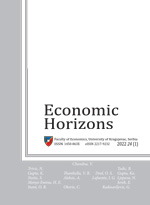DEBATE ON THE FINANCIAL STRUCTURE OF AND ECONOMIC GROWTH IN SUB-SAHARAN AFRICA: THE MODERATING EFFECT OF INSTITUTIONAL QUALITY IN AN INCOME-BASED PANEL
Obukohwo Oba Efayena1, Jonathan Ojarikre Oniore2 and Ngozi Patricia Buzugbe1
1 University of Nigeria, Department of Economics, Nsukka, Enugu State, Nigeria
2 Bingham University, Department of Economics, Karu, Nasarawa State, Nigeria
This study x-rays the moderating influence of institutional quality on the relationship between the financial structure (FS) and economic growth in 33 Sub-Saharan African (SSA) economies from 2006 to 2022, based on income classification. Aptly utilizing the two-step fixed-effects generalized method of moments, the investigation found that, among the low-income countries, those bank- and market-oriented were associated with the lower and higher levels of economic growth, respectively, whereas among the middle-income countries, those bank- and market-oriented financial structures were associated with the higher and lower levels of economic growth, respectively. Notably, the study establishes that institutional quality does not substantially spur the financial structure to positively contribute to economic growth. The disaggregated outcomes show that prevailing institutional quality mitigates the growth effects of the financial structures of the middle-income economies, whereas it does significantly exacerbate decelerating economic growth among the low-income ones. The study recommends the adoption of policies to strengthen institutional quality, as well as the enhancement of the synergy between the banking sector and the capital market.
Keywords: financial, growth, income, institutions
JEL Classification: E44, E46, O16
Economic Horizons, 2025, 27(1), 111-126. Published online April 8th 2025
doi:10.5937/ekonhor2502117E




